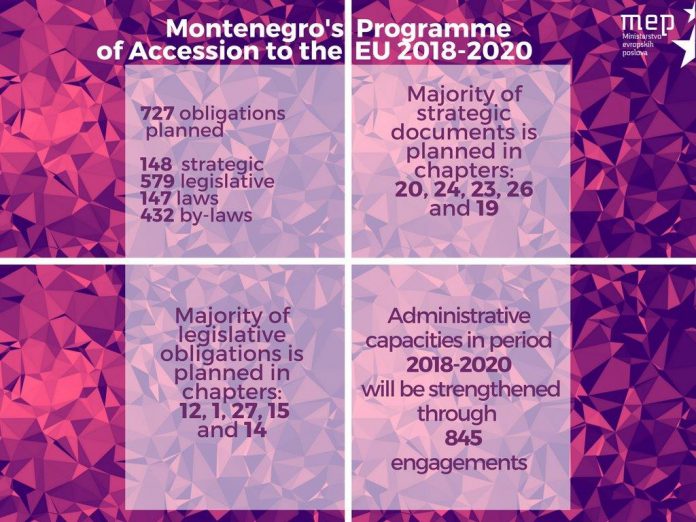Amongst its numerous commitments during the first year of its four-year term, the Ministry of European Affairs in September got down to coordinating the development of the new Programme of Accession of Montenegro to the EU (PAMNE) the adoption of which is planned for January 2018.
The Accession Programme constitutes a plan for the creation and establishment of the legal framework (laws and bylaws), strategic plans (strategies and action plans), but it also expresses the needs for administrative capacities and plans and needs for the strengthening of the personnel or for the reorganization of the existing staff within the system involved in the activities important for the European integration of our country during the next three-year period. Adequate implementation of the legal framework and of the strategic plans is impossible without the strengthening of administrative capacities, and/or the staff which is capable and ready to respond to all the demands and challenges entailed by the accession process and the subsequent membership.
Programme of Accession of Montenegro to the EU (PAMNE) 2018 – 2020 is a comprehensive document which is focused on the transposition of the EU Acquis, covering the commitments from 33 negotiation chapters, which are being negotiated by Montenegro.
Its adoption is planned in parallel with the adoption of the Mid-term Government Work Programme 2018 – 2020 and the Programme of Economic Reforms etc. By its structure, the Accession Programme is defined as a tabular presentation offering a high quality overview of the relevant legislation for the chapters, institutions entrusted with its implementation, degree of alignment with the EU Acquis and the deadline for thorough alignment in case of partial or lacking alignment. It contains several segments, as follows: introduction to a chapter, current state of play, and/or the status in the legislative and strategic framework, administrative capacities, as well as future activities, i.e. plan for the adjustment to the EU Acquis.
During the past years, i.e. since 2014, through the implementation of the Accession Programme we have been diligently building legal and strategic framework and strengthening administrative capacities in relation to the commitments from the negotiation process with a view to transposing the European standards in numerous areas of life and achieving higher quality of life of our citizens. The Accession Programme enables clearer and faster and more operative monitoring, coordination and perceiving of all the activities of all key actors in the process.
In order to be able to define in a strategic, comprehensive and clear way the commitments, scope and dynamics of the reforms that are necessary for further adjustment of Montenegro to the EU Acquis, we have got down to developing the new Accession Programme 2018 – 2020 because of the necessity for as precise planning as possible and mutual coordination among various institutions. Although the task of three-year planning is not at all straightforward, this document will determine indicative commitments which need to be fulfilled by 2020 with the purpose of reaching internal readiness for the EU membership.
These commitments comprise further work on the harmonization of domestic regulations with European, and more importantly, on the strengthening of the capacities for their high quality implementation which brings visible and measurable results, and/or crucial and measurable changes for the citizens.
The Accession Programme is, one might say, the first document which consolidates all significant regulations that are linked to the EU directives so as to make a whole, enabling mutual and better planning and coordination for the institutions especially if one has in mind that some laws and strategic documents include the commitments from several negotiation chapters, the implementation of which therefore involves several institutions. Nevertheless, it is important to understand that the Accession Programme is not a document that covers the entire European agenda, but that it represents a need for streamlining the commitments in the coming years for the sake of balanced negotiations, and/or fulfilment of the commitments.
Large number of institutions are involved in drafting the document, including four directorates from the Ministry of European Affairs, the competences of which are the Acquis, EU accession, strategic planning and monitoring of the implementation of strategies, information and IT support. Reflecting the commitments in all negotiation chapters, and the fact that it concerns a large number of institutions points out to the importance of this document the implementation of which concerns all citizens, from entrepreneurs, farmers, business and academic community. This is, concurrently, one of the reasons for the importance of the participation of a broader structure including civil sector, and/or nongovernmental organizations. In this way, citizens are able to exert direct influence on decision making and/or on the policies that concern them, making thus the whole process transparent and public.
The NGO representatives who are at the same time the members of the working groups who will also be involved through the work of sectorial working groups that will be dealing with the issues according to the topics of related chapters, at the earlier stage of planning the PAMNE after the first draft document has been made. This approach constitutes a novelty introduced because of the need to involve the interested civil sector representatives in the drafting one of the most important strategic documents literal and efficient implementation of which will ensure successful continuation of reforms and further progress towards the EU membership. The proposals of the NGO representatives during earlier consultations are also welcome.
Because of all this, we believe that high quality and comprehensive preparation followed by a dedicated and thorough implementation of the Programme will bring us significantly closer to European standards and consolidate the already traced path towards the EU membership.
Author: Marina Vujačić, Former State Secretary at MEA
This aricle is published in MEA magazine Eurokaz


